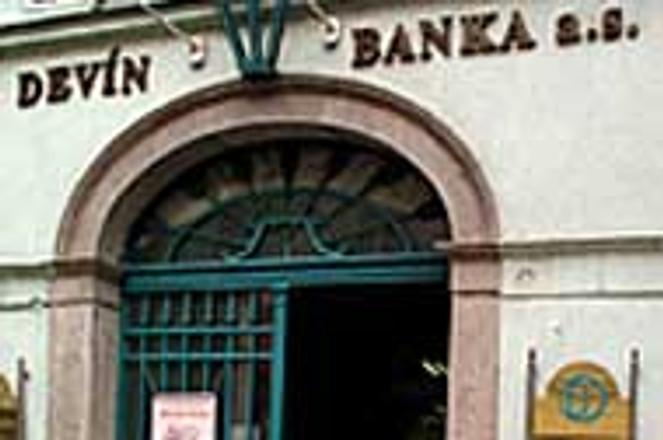Pulled back from the brink. Having received a controversial loan from the government, Devín banka has shown signs of recovery.photo: ČTK
Ailing finance house Devín banka, which only two months ago was pulled back from the brink of a dramatic collapse, is set to get back on its feet after reaching an agreement with the Finance Ministry over Russian debt.
The August 10 signing of a mandate between the Finance Ministry and the bank, which gives Devín the task of recovering $60 million worth of Russian debt to Slovakia, finally allowed the bank to meet minimum reserve requirements (MRR) August 15 - a feat it had failed to achieve in the last five of the central bank's regular two week monitoring periods.
Board members at the troubled bank had originally said that the MRR would not be met before the end of August, but after meeting the requirement mid-month said it was sure sign of the bank's recovery.
"The situation at Devín banka is now good and the bank is very pleased. Devín banka should now progress back to full health," bank spokesperson Oľga Viestová told The Slovak Spectator.
The National Bank of Slovakia (NBS) has been following the progress of Devín banka closely since the government extended a 2.5 billion crown credit to the bank in June. The bank was on the verge of collapse at the time, but the government said that it had reluctantly decided to give the loan to relieve pressure on the Deposit Protection Fund, a controversial fund set up to guarantee the repayment of client deposits in the event of a bank collapse. Four Slovak banks had crashed in the 12 months preceding Devín's problems, virtually emptying the Fund's coffers.
Devín banka's recovery has been seen as pivotal to the development of the banking sector in Slovakia, and if its fortunes are reversed, the government will be seen to have passed a stern policy test after extending the loan to the bank.
"Of course it was a risk for the government [to bail out Devín], but it wasn't at all certain that the central bank would have moved in to slap a caretaker administration on the bank even if it hadn't met the reserve requirements," said Miloš Božek, analyst at J & T Securities in Bratislava.
He added that the bank still played an important role in the government's plans for collection of the 'Russian' debt, which was inherited from the former Soviet Union. "There are few other institutions that one can think of that could reclaim the debt. It [Devín banka] has good connections on the Russian side," said Božek.
Central bank governor Marian Jusko said after the agreement was signed that the NBS was pleased the bank was getting back on its feet.
"We support the recovery process of Devín banka, and we are glad that the meeting of the requirement at the moment is much better compared with the catastrophic situation recently," said Jusko.
Analysts have also welcomed the mandate's signing, citing the resolution of the impasse between the finance house and the Finance Ministry as a positive for the country's banking sector. However, they sounded a note of caution at the progress the bank may make.
"Anything that can help the bank to recover is good," said Martin Barto, chief of strategy at Slovakia's largest bank, Slovenská sporiteľňa (SLSP). "But the thing is that no one knows exactly what will happen to Devín banka."
He added: "It is defnitely a plus for the banking sector though. It's better to have all the banks healthy than have banks with problems."
The agreement between the Finance Ministry and the bank had been stalled for months on a penalty the ministry wanted to levy against the bank for failing to clear the Russian debt within a period specified by the ministry. That period would have expired on October 31 this year, but has now been extended by two months, and the penalty clause has also been lifted in the mandate.
Devín banka will receive 20% of the full $60 million for settling the debt.
Both the Finance Ministry and Devín banka are keeping an information embargo on the full details of the agreement, and neither party was prepared to comment on their part in breaking the deadlock.
While the finance house remains confident it can meet the year-end deadline for unblocking the debt, Devín banka still remains a thorny issue for the government. Following its successful bid in a controversial tender to unblock Russiaşs old debt to Slovakia in 1999, the bank has been accused of being a political lobbying body, with general director Ľubomír Kanis openly supporting the coalition Democratic Left Party (SDĽ).
The bank has also been a strong advocate of the completion of the third and fourth reactor blocks of the Mochovce nuclear power station despite government opposition to the plans. It had previously mediated a $150 million Russian loan for the construction of the blocks, while the SDĽ nominated Štefan Košovan, a former member of Devín bankaşs board of directors who still has an ownership interest in the bank, to the head of Slovenské elektrárne, the state-owned power monopoly operating Mochovce. Košovan was recalled this March.
The bank closed 1999 with a net profit of 36.29 million crowns, three million less than in 1998. While its total assets doubled to 13.18 billion crowns over 1999, a large portion of these assets consisted of various claims and debts.


